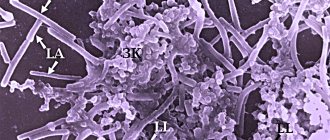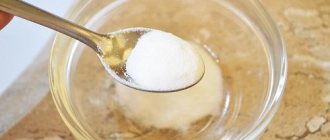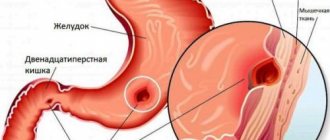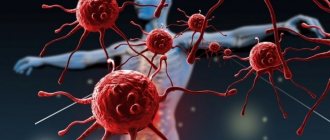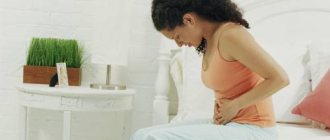The lack of vegetables, fruits and herbs in the menu, stress, and uncontrolled use of painkillers are the main causes of chronic constipation. When they occur, there is an imbalance in the intestinal microflora, harmful bacteria and toxins accumulate, and a feeling of discomfort appears.
When taken frequently, laxatives lose their effectiveness and can become addictive. Therefore, many experts recommend taking complexes of beneficial bacteria for constipation. Will probiotics protect against hard stool? Let's find the answer to this question together.
What are probiotics
Probiotics, or eubiotics in other words, are beneficial live bacteria that, in the normal state of the intestines, create a healthy microflora. That is, these are substances necessary for the body that can suppress the negative effects of pathogenic and opportunistic microbes.
Such microorganisms have many beneficial properties:
- Responsible for the synthesis of biotin, folic acid and vitamin K.
- Promote the regeneration of the mucous membranes of the body and restore the microflora.
- Prevent exposure to pathogenic and toxic substances.
- Increase protective functions.
Changes in the composition and quantity of intestinal bacteria provoke disorders, causing dysbiosis and other diseases in children and adults.
Treatment tactics, general principles
Medicines for dysbiosis
To make a diagnosis, you should undergo a physical examination by a doctor. Depending on the manifestations of the disease, this may be a pediatrician, therapist, gastroenterologist, gynecologist or dentist.
An imbalance of microflora must be confirmed by laboratory tests. For problems with the gastrointestinal tract, this is a stool analysis, for the oral cavity - bacterial cultures, for the reproductive system - gynecological smears, bacterial cultures, PCR tests.
Classification of probiotics
There is a whole classification of drugs that improve intestinal microflora:
- First generation - only one type of microorganism is present. Representatives are Bifidumbacterin, Dactobacterin, Colibacterin and others.
- Second generation - such probiotics contain yeast fungi and bacilli, which, upon penetration into the body, have a therapeutic effect and help normalize normal intestinal flora. Effective representatives of the second row: Biosporin, Bactistatin, Sporobacterin.
- The third generation consists of drugs that contain a whole range of beneficial strains of bacteria and various additives. These drugs include: Acipol, Bifiliz, Linex, Lebenin.
- The fourth generation is a probiotic medicine based on bifidumbacteria with a pronounced sorbing effect. Representatives are: Probifor, Bifidumbacterin Forte, Florin Forte.
There are currently a lot of probiotic manufacturers. However, it is recommended to choose products that are manufactured by domestic pharmaceutical companies, since such preparations contain beneficial bacteria that are adapted to the climate in Russia. While foreign drugs often have low therapeutic properties.
Also, before you start taking probiotics, you should familiarize yourself with the procedure for taking them. All features are described in the instructions or you can consult a doctor. It is impossible to take drugs uncontrollably, as they can cause severe pathological disorders. Improper use of probiotics can cause weight gain, an allergic reaction, an imbalance of cytokines in the body, and the formation of stones in the urinary and gall bladder.
Prebiotics
Most natural prebiotics are found in many foods: cereals, dairy products, spreads, cookies, bananas, chocolate and others.
Prebiotics can be obtained not only from tablets.
The most common prebiotics:
- Lactulose. Has a positive effect when a child experiences constipation.
- Oligofructose. The conversion of oligofructose in the large intestine leads to the formation of positive effects, such as: accelerating the digestion of food, improving calcium absorption, increasing the volume of feces, reducing the level of harmful fats in the blood, stimulating the growth of beneficial bifidobacteria in the intestines. In turn, the growth of bifidobacteria helps reduce the level of toxins in the blood, and also stimulates the production of vitamins and enzymes in the child’s gastrointestinal tract.
- Inulin.
- Galacto-oligosaccharides.
- Breast milk oligosaccharides.
Probiotics for the intestines: list of drugs
The most effective probiotic preparations for normalizing microflora and combating pathological conditions of the intestine are:
- Bifidumbacterin is available in many dosage forms: tablets, suppositories, powder, capsules, ampoules, dry and liquid mixture. The composition contains bifidobacteria in various doses. A product is used to suppress the activity of pathogenic and opportunistic microbes. Prescribed for adults and children over 3 years of age.
- Linex - presented in the form of capsules for oral administration. The active components of the probiotic are bifidumbacteria, enterococci and lactobacilli. They promote the formation of healthy flora, provoke the production of essential vitamins, cause an acidic environment and improve the functioning of digestive enzymes.
- Biosporin is a second generation drug. Contains a large number of living bacteria - up to 2 billion. Available in the form of tablets and powder for further preparation of the solution. It has a broad therapeutic effect and can be used for the treatment and prevention of intestinal disorders in adults and children.
- Colibacterin is available in powder form for oral administration. The basis of the probiotic is the dry mass of live E. coli. The pharmacological effect is to fight pathogenic microbes, improve immune status and produce the body necessary vitamins, enzymes, and amino acids. The drug has a detrimental effect on Proteus, Salmonella and Staphylococcus. Intended for the treatment of adults and children.
- Acipol is an effective probiotic in capsules for all age groups. It has a complex and healthy composition, which includes live lactobacilli and kefir grains. Taking the medicine helps restore damaged flora, activates the synthesis of important biological substances and helps improve intestinal motility, preventing constipation. The list of indications is quite large.
Any generation of probiotics must be taken correctly, it is advisable to consult your doctor first. This will help avoid negative consequences and increase the therapeutic effect of the drugs.
Specialized nutrition for constipation in children
The main goal of therapy in the treatment of constipation in children is the restoration of impaired passage of intestinal contents and regular bowel movements, which is facilitated by metabolites of bifidobacteria and lactobacilli. Lactic, acetic, formic, propionic, butyric acids regulate intestinal motility and have an antibacterial effect. For children in the first year of life, it is preferable to use diet therapy, i.e. use adapted milk formulas for functional nutrition, complementary feeding products containing pro- and prebiotics .
The therapeutic effect of mixtures containing lactulose is due to the fact that lactulose, an isomer of lactose, is not broken down by the enzyme lactase and enters unchanged into the lower intestine, where it serves as a substrate for bifidobacteria and lactobacilli, which, metabolizing lactose, produce a number of short- and medium-chain fatty acids (acetic, propionic, butyric, etc.). These acids, irritating the receptors of the colon, stimulate its motor activity . In addition, a high concentration of unsplit lactulose and organic acids creates increased osmotic pressure in the intestinal lumen, attracting water into the intestinal lumen, which also contributes to the softening of stool and bowel movement. Formulas containing lactulose can be recommended in full or in an amount of 1/3-1/2 of the required volume at each feeding in combination with a regular adapted milk formula until a lasting therapeutic effect is achieved.
When treating children of all ages suffering from constipation, it is advisable to use specialized products containing dietary fiber (Bionectaria) ; at an early age - complementary feeding products with the addition of pre- and probiotics. Regular consumption of fermented milk products (of varying degrees of adaptation) is mandatory in order to stimulate intestinal motility and correct microbiocenosis, violations of which are always secondary.
From birth, you can use liquid synbiotics Normoflorin-L (L.acidophilus not less than 1010 CFU/ml) and Normoflorin-B (B.bifidum, B.longum not less than 1010 CFU/ml), after 6 months of age Normoflorin-D (L.casei Sub.
DAILY REGIME
Despite the significant role of diet, it may not be effective if the child does not develop the habit of emptying his bowels at a certain time, preferably in the morning (6-9 hours). This habit should be developed and reinforced. To do this, immediately after getting up in the morning, the child drinks 1/2 - 1 glass of cold water or vegetable juice on an empty stomach; if there is a urge to stool, then the patient empties the intestines as much as possible. If there is no urge to defecate, you should first resort to physical exercise, breakfast and after a while go to the toilet. The pose is taken in a squatting position, with the legs tucked to the stomach. The act of defecation is aided by self-massage of the abdomen with hands, rhythmic retraction of the anus, and pressure between the tailbone and the anus.
Appropriate conditions must be created for the child. If the child is small, then it is better to sit him not on the toilet, but on the potty (previously washed clean and warmed slightly above body temperature). Restoring the act of defecation is a long-term task and should be carried out persistently, without emotional outbursts, by parents and adults in direct contact with the child.
EXERCISE STRESS
For chronic constipation, daily dosed physical activity is necessary - walking, morning exercises, outdoor games, skiing, skating, swimming. During classes at school, physical education breaks should definitely be held during lessons. Most exercises should be aimed at stimulating the muscles of the anterior abdominal wall, for example, the complex that we offer.
| Free ventilation of the room. Walking in place | 30 sec |
| IP (starting position): sitting on a chair, hands to shoulders. Raise your arms up, tilt your torso back - inhale. Hands to shoulders, torso slightly tilted forward - exhale | 2 – 8 times |
| IP: sitting on a chair. Raising your arms to the sides – inhale. Raise your right leg, bent at the knee, press it to your stomach - exhale. Also with the left leg | 2 – 8 times |
| IP: sitting on a chair. Alternately pulling up and moving the straight leg to the side | 2 – 8 times |
| IP: standing. Deep breathing | 2 – 4 times |
| I.p.: sitting on a chair, support your hands behind you, legs bent. Spreading your legs to the sides | 4 – 8 times |
| IP: standing, arms to the sides. Taking the leg forward, to the side, back, alternately with the right and then with the left | 2 – 8 times |
| I.p.: standing, hands on the belt. Half squat with arms pulled back | 2 – 6 times |
For young children, physical exercise should be in the form of play. For example, we recommend this exercise. Scatter 20-30 small toys on the floor and ask the child to collect all the toys, bending over each one from a standing position. This “exercise” should be repeated 2-3 times during the day.
In addition to the procedures described, the doctor will prescribe some medications for the child. They should be taken strictly in the amount recommended by the specialist. Do not self-medicate or use laxatives. Only correct and consistent implementation of our recommendations will help children get rid of chronic diseases; they will delight you with cheerful laughter, excellent success in school, excellent appetite and excellent health.
Take Biovestin probiotics and stay healthy!
Gastrointestinal diseases
Microorganisms in the human intestine take up a lot of space. But in terms of mass, they weigh approximately 2-3 kg for an adult. A person of such weight not only has to be given water and food, but often also treated.
Artificial support is also often required for the intestines under conditions of stress, poor nutrition, and a sedentary lifestyle. And so-called probiotics and prebiotics are suitable for this case.
